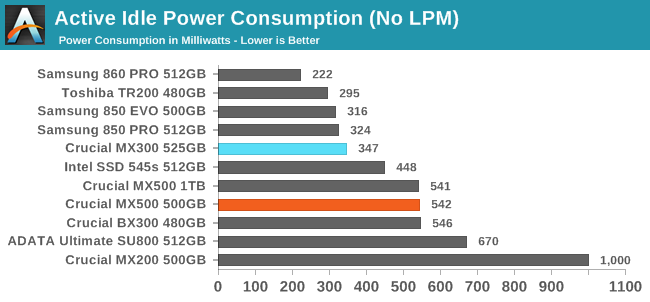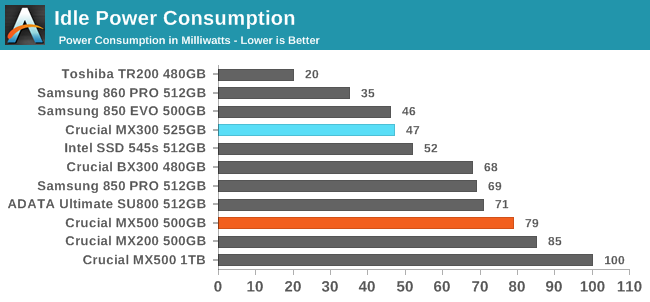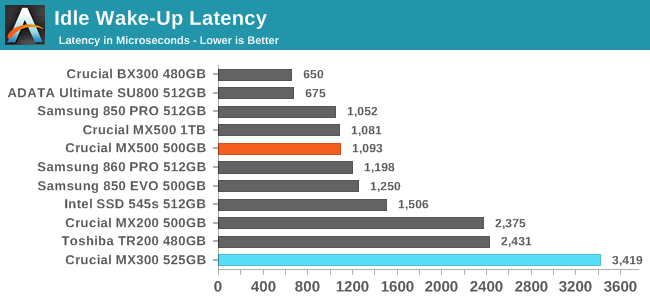The Crucial MX500 500GB SSD Review: A Second Look
by Billy Tallis on February 2, 2018 9:30 AM ESTPower Management
Real-world client storage workloads leave SSDs idle most of the time, so the active power measurements presented earlier in this review only account for a small part of what determines a drive's suitability for battery-powered use. Especially under light use, the power efficiency of a SSD is determined mostly be how well it can save power when idle.
SATA SSDs are tested with SATA link power management disabled to measure their active idle power draw, and with it enabled for the deeper idle power consumption score and the idle wake-up latency test. Our testbed, like any ordinary desktop system, cannot trigger the deepest DevSleep idle state.
Idle power management for NVMe SSDs is far more complicated than for SATA SSDs. NVMe SSDs can support several different idle power states, and through the Autonomous Power State Transition (APST) feature the operating system can set a drive's policy for when to drop down to a lower power state. There is typically a tradeoff in that lower-power states take longer to enter and wake up from, so the choice about what power states to use may differ for desktop and notebooks.
We report two idle power measurements. Active idle is representative of a typical desktop, where none of the advanced PCIe link or NVMe power saving features are enabled and the drive is immediately ready to process new commands. The idle power consumption metric is measured with PCIe Active State Power Management L1.2 state enabled and NVMe APST enabled.


With less DRAM, the 500GB Crucial MX500 saves a bit of power relative to the 1TB model when the drives are in low power state, but their active idle power consumption is essentially the same. In both scores, the Crucial MX500 is worse than many competitors and the predecessor MX300.

The Crucial MX500 is reasonably quick to wake from idle, though the BX300 and the ADATA SU800 are substantially faster to wake up with the same SSD controller. The MX300 had been unusually slow to wake.










25 Comments
View All Comments
jordanclock - Friday, February 2, 2018 - link
Generally, any good SATA SSD is going offer much the same performance as any other model. The gains when going from the second (or even fifth) best SSD on SATA to the absolute best are tiny. Plus, given the capacity you would want for a console, I think going for a 'mediocre' SSD will offer all the performance you need without spending twice as much for less than one second load time differences.leexgx - Tuesday, February 20, 2018 - link
this is true once you have a SSD (any) in a console your purely limited by the CPU speed and ram in the PS4 or xbox it self (some youtubers have tested it) even to the point the SSHD from seagate and toshiba after the second load is nearly the same as a SSD (but it has to have read the data before so if you load the same game or save twice for it work well witch mite happen if you die a lot and fall back to a checkpoint save) if you switch between games SSHDs can at times offer not as much benerfitstill can't beat SSDs for consistency as it always be the same speed
tamalero - Friday, February 2, 2018 - link
Those prices feel really nice!Hurr Durr - Sunday, February 4, 2018 - link
It's not nice until we hit around 10 cents for the gigabyte.zirk65 - Friday, February 2, 2018 - link
Looks similar to the MX200, but with bigger pipes and better thermals.MX200 = MLC NAND / Marvel Controller
MX500 = TLC NAND / Silicon Motion Controller
Yet I wonder much is different between the controller uArch these days, outside of specific I/O and power functions.
mode_13h - Friday, February 2, 2018 - link
Last I checked, Crucial's MX-series SSDs featured end-to-end data protection. Does Samsung offer anything like that, in their consumer drives?letmepicyou - Friday, February 2, 2018 - link
Say Mr. Tallis, I'm sure I'm not alone when I ask this (feel free to chime in, guys) but there are those of us out here who want the greater capacity of a 1tb drive whilst not wanting to fork over 1tb drive prices. I can RAID 0 a pair of ~500gb drives and get better performance than a single 1tb drive, while spending $60-$120 less.What I'm saying is, I would love to see how your arsenal of ~500 gb drives perform in RAID. I have a feeling others would like to see the same information.
Billy Tallis - Friday, February 2, 2018 - link
You can't get a pair of 500GB drives for $60 less than the price of a 1TB drive from the same product line, unless you're looking at an unusually good sale on the 500GB drives and not looking for the best price on a 1TB drive. Every 1TB SATA drive I price checked this week was cheaper per GB than its half-TB counterpart.As for RAID testing, my collection of drives almost never includes more than one of each. At the moment I'm finishing up a NVMe RAID review using a set of drives that was loaned by a vendor specifically for this review. Between the disappointing results I'm getting from that project and the prices I'm seeing that don't make SATA RAID economical either, it's not a priority for me to test SATA RAID.
Wardrop - Saturday, February 3, 2018 - link
Is that a software raid or hardware raid you used for your NVMe raid review. I'm guessing software as I'm not even sure any NVMe raid solutions exist. In that case, I imagine we're back to needing dedicated RAID controller to deal with the order of magnitude increase in drive performance compared to HDD's, and then obviously you're left questioning who needs double the increase in sequential performance when a single drive is usually more than fast enough for any sequential workload.peevee - Monday, February 5, 2018 - link
Check m.2 PCIe/NVMe 1TB and 2TB prices.But you'll need an MB with 2 M.2 slots with 4x PCIe connected to CPU, are those even available? Otherwise latencies will dominate the performance (like for M.2 which only provide SATA, either slots or drives).